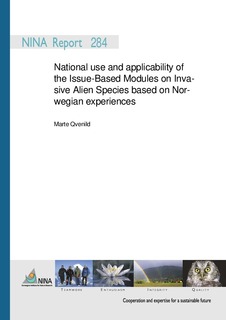National use and applicability of the Issue-Based Modules on Invasive ALien Species based on Norwegian experiences
Research report

Åpne
Permanent lenke
http://hdl.handle.net/11250/2455197Utgivelsesdato
2007Metadata
Vis full innførselSamlinger
- NINA Rapport/NINA Report [2341]
- Publikasjoner fra CRIStin - NINA [2364]
Sammendrag
Qvenild, M. 2007. National use and applicability of the Issue-Based Modules on Invasive Alien Species based on Norwegian experiences. - NINA Report 284. 30 pp.
The IUCN- project “Issue-Based Modules for coherent implementation of biodiversity related conventions” offers a thematic approach to the national implementation of biodiversity related Multilateral Environmental Agreements (MEAs). The project is based on the assumption that various MEAs address similar environmental challenges, and that it is possible to meet obliga-tions of common concern in multiple MEAs more coherently. Norway has been working for the harmonisation between different agreements within the field of biological diversity for a long time and is a Pilot country for the development and implementation of the Issue-Based Modules, in particular on Invasive Alien Species (IAS). The Norwegian case study has reviewed the Issue-Based Modules on IAS against the work of several Norwegian Ministries to develop a Norwegian National Strategy on Alien Species that was launched on the 31st of May 2007. An assessment was undertaken to identify how the Issue-Based Modules on IAS could be used to make a draft of the Norwegian National Strategy on Alien Species more concrete and ensure more coherent implementation of MEAs across sectors. Several approaches to achieve this were suggested. One approach was to check the single initiatives in the draft Norwegian National Strategy on Alien Species against the obligations and commitments from the different MEAs as included in the Issue-Based Module on IAS, which provided a useful insight to where the draft strategy supported implementation of MEAs as well as the weaker parts. Another suggestion was for the different Ministries to look at obligations in different MEAs that overlap and can be implemented simultaneously across sectors. A third way to use the module was to select some thematic initiatives in the draft Norwegian strategy and list relevant obligations from the MEAs to illustrate how the initiatives in the draft strategy could be more specific on how to follow up on international commitments across sectors. The overall impression is that while the draft strategy covered the relevant obligations and commitments of the MEAs, the listed initiatives on how to follow up were quite vague. This is also the case for the finalised Norwegian National Strategy on Alien Species. The Issue-Based Modules could therefore be a useful tool in the further implementation phase of the Norwegian National Strategy on Alien Species when making the listed initiatives more concrete, detailed and operational. The IUCN case-study and the workshop contributed to make experts in different Ministries more aware of the Issue-Based Modules and the final Norwegian National Strategy on Alien Species states that the Issue-Based Modules are expected to be useful in the further imple-mentation of the Norwegian strategy. review of Issue-Based Modules, Invasive Alien Species, Implementation of Multilateral Environmental Agreements, Collaboration between governmental sectors, Norway as a Pilot Country in IUCN project, implementerings-verktøy for internasjonale miljøavtaler på feltet fremmede arter, sektor samarbeid, Norge som pilot land for IUCN prosjekt